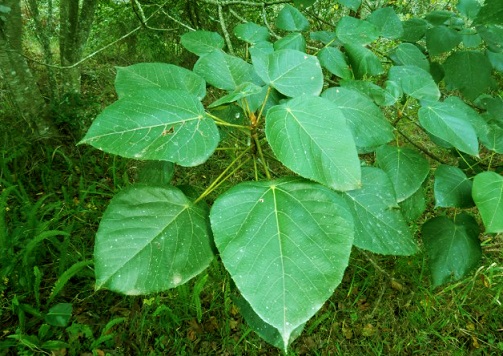The Phytochemical Mappain Shows Potential in Fighting Inflammation Linked to COVID-19
Nikhil Prasad Fact checked by:Thailand Medical News Team Dec 19, 2024 1 year, 4 weeks, 1 day, 16 hours, 23 minutes ago
Medical News: The COVID-19 pandemic, caused by the SARS-CoV-2 virus, has profoundly impacted global health, resulting in over 35 million deaths worldwide and more than 900 million confirmed cases so far. The pandemic has presented unique challenges, including the need for effective treatments that address the severe inflammatory responses, known as cytokine storms, triggered by the virus. A new study explores the potential of Mappain, a naturally derived phytochemical compound, in mitigating these inflammatory responses. Mappain is a prenylated stilbene extracted from plants in the Macaranga genus, which have a history of medicinal use.
 The Phytochemical Mappain from the Macaranga Plant Shows Potential in Fighting Inflammation Linked to COVID-19
The Phytochemical Mappain from the Macaranga Plant Shows Potential in Fighting Inflammation Linked to COVID-19
Researchers from institutions in Nigeria and Sudan, including the Pan African University Life and Earth Sciences Institute, the University of Ibadan, and the University of Khartoum, conducted this groundbreaking study to evaluate Mappain’s antiviral and anti-inflammatory properties.
The Role of SARS-CoV-2 Envelope Protein
Central to the study is the SARS-CoV-2 envelope (2E) protein, a small structural component of the virus that plays a pivotal role in its lifecycle and pathogenicity. The 2E protein’s interaction with host cells can disrupt cellular functions and trigger excessive inflammatory responses. Researchers aimed to determine whether Mappain could inhibit the activities of the 2E protein and alleviate the associated inflammation.
This
Medical News report delves into the innovative approach researchers adopted, combining computational and laboratory methods to explore Mappain’s capabilities.
Study Methodology
The research employed two primary approaches: computational molecular docking and in-vitro experiments. Molecular docking simulations evaluated Mappain’s ability to bind to key viral proteins, including the 2E protein, and host receptors involved in inflammatory responses. These interactions were compared to Amantadine, a known antiviral drug.
In the laboratory phase, Mappain’s effects on human immune cells (peripheral blood mononuclear cells or PBMCs) were tested. The researchers measured the levels of inflammatory markers, such as interleukin-6 (IL-6) and tumor necrosis factor-alpha (TNF-α), after exposure to the 2E protein and treatment with Mappain.
Key Findings
The study yielded promising results, suggesting Mappain’s potential as a multi-target antiviral and anti-inflammatory agent:
-High Binding Affinity: Mappain demonstrated strong binding to the 2E protein (−9.6 kcal/mol) and key host receptors like Toll-like receptor 2 (TLR2; −9.7 kcal/mol) and TLR8 (−9.9 kcal/mol). These interactions were significantly stronger than those observed with Amantadine.
-Reduction of Inflammatory Markers: In v
itro experiments showed that Mappain effectively reduced the expression of IL-6 and TNF-α in immune cells exposed to the 2E protein. This reduction was observed both when cells were pre-treated with Mappain and when Mappain was directly mixed with the 2E protein before cell exposure.
-Pathway Insights: Pathway enrichment analysis revealed that Mappain targets pathways associated with Toll-like receptor signaling and COVID-19-related inflammation. These findings suggest that Mappain’s anti-inflammatory effects are mediated through multiple mechanisms.
Mechanism of Action
Mappain’s unique chemical structure, including its prenylated stilbene backbone, contributes to its effectiveness. The compound’s hydrophobic properties enable it to interact strongly with the hydrophobic regions of the 2E protein and TLRs. These interactions likely disrupt the processes that lead to cytokine storms.
The study also highlighted Mappain’s potential to inhibit pro-inflammatory cytokines and modulate key signaling pathways, such as the MAPK and Toll-like receptor pathways. By targeting these pathways, Mappain may prevent the overactivation of immune responses that can lead to severe complications in COVID-19 patients.
Implications for Drug Development
Mappain’s dual antiviral and anti-inflammatory properties position it as a promising candidate for further drug development. Unlike single-target drugs, Mappain’s multi-target approach could make it more effective against SARS-CoV-2, particularly as the virus continues to mutate.
The compound’s ability to inhibit TLR-mediated signaling suggests potential applications beyond COVID-19. TLRs play a role in various inflammatory diseases, and Mappain’s properties may be harnessed to develop treatments for conditions such as autoimmune disorders and other viral infections.
Study Limitations and Future Directions
While the findings are encouraging, the study acknowledges the need for further research. The computational simulations relied on static models of the 2E protein, which may not fully capture the protein’s dynamic behavior. Additionally, in vivo studies are necessary to validate the in vitro results and assess Mappain’s safety and efficacy in living organisms.
Future research should also explore Mappain’s pharmacokinetics and potential interactions with other drugs. Understanding these factors will be crucial for translating the compound’s promising properties into a clinically viable treatment.
Conclusions
Mappain emerges as a natural compound with significant potential to address the dual challenges of viral replication and inflammation in COVID-19. By targeting the SARS-CoV-2 2E protein and modulating inflammatory pathways, Mappain demonstrates a capacity to mitigate the severe immune responses associated with the virus.
The study underscores the value of exploring natural products for drug discovery, particularly in the context of emerging infectious diseases. With further research, Mappain could contribute to a new generation of treatments that are effective against both the virus and its inflammatory complications.
The study findings were published in the peer-reviewed journal: Discover Molecules.
https://link.springer.com/article/10.1007/s44345-024-00006-4
For the latest COVID-19 News, keep on logging to Thailand
Medical News.
Read Also:
https://www.thailandmedical.news/news/moslae-herba-as-a-potential-herbal-remedy-for-covid-19
https://www.thailandmedical.news/news/singapore-led-study-finds-papaya-leaf-extract-effective-against-coronaviruses-and-inflammation
https://www.thailandmedical.news/articles/herbs-and-phytochemicals
https://www.thailandmedical.news/articles/coronavirus
